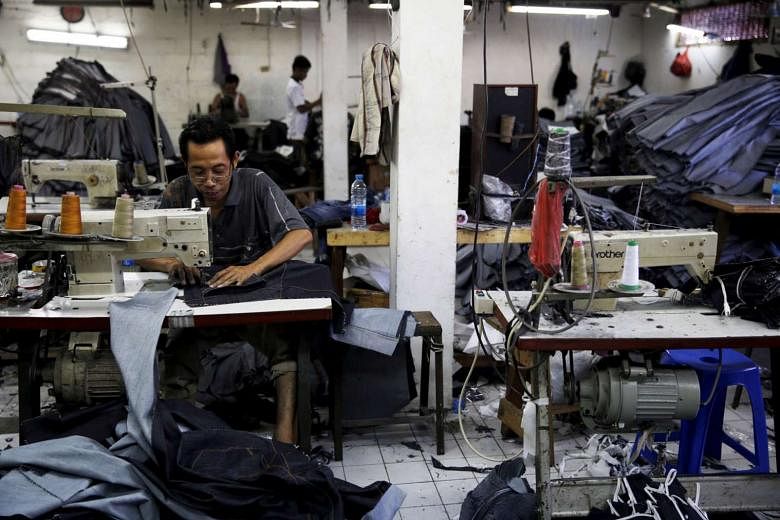In May this year, President Joko Widodo, himself a former businessman, declared that Indonesia needed up to 5.8 million more entrepreneurs so that the country would reach the Asean average of 4 per cent of the population.
The task seems daunting. However, it is a necessary one, not only to secure Indonesia's economic development, but for its own sense of socio-economic justice.
Just as importantly, the region's future relies on this giant country developing well. Indonesia is the largest market in South-east Asia. Globally, it is the fourth most populated country and the third largest democracy; and it has the world's largest Muslim population.
It has come a long way since the 1997 Asian economic crisis. On average, its economy has grown at more than 5 per cent per annum over the past decade.
However, as Indonesian governments have repeatedly stated, the country seriously lacks businesspeople. The number of entrepreneurs is only 1.6 per cent of its total population. In comparison, Singapore has 7 per cent; Malaysia, 6 per cent; Thailand, 5 per cent; and Vietnam, 3 per cent.
The need for more entrepreneurs is not only an economic matter, but one of political expediency.
 An employee stitching a pair of jeans at a small factory in Jakarta, Indonesia. While the country has comparatively few entrepreneurs, the idea of running their own businesses is gaining traction, especially among the young. The government hopes to increase the number of local entrepreneurs by 5.8 million. PHOTO: REUTERS
An employee stitching a pair of jeans at a small factory in Jakarta, Indonesia. While the country has comparatively few entrepreneurs, the idea of running their own businesses is gaining traction, especially among the young. The government hopes to increase the number of local entrepreneurs by 5.8 million. PHOTO: REUTERS
The main actors in Indonesia's business landscape have long been assumed to be the country's tiny Chinese minority (one to three per cent of the population). Ethnic, economic, political, cultural and religious factors have often mingled to the detriment of the growth of an indigenous (pribumi) business class.
What has been encouraging for the government is that, in the last decade, there has been a more visible, growing culture of entrepreneurship among the pribumi. Democratic reforms, decentralisation and the deregulation of certain sectors of the economy, facilitated by information technology, have enabled a new generation of entrepreneurs to emerge outside the traditional system of political patronage.
Innovative forms of networking are taking shape within local and national business associations, networking forums and the marketing and business media.
Indeed, while civil servant positions are still highly sought after because of the social prestige and the security of employment, the idea of entrepreneurship and commerce as professions is becoming increasingly popular, especially among the young. The country's economic development and glamorous portrayals of various "entrepreneur-cum- self-made men/women" role models have increased the social legitimacy of entrepreneurship.
There is an increasing emphasis on entrepreneurial skills in educational institutions and universities in Indonesia, in particular among private institutions.
This is occurring in tandem with increased attention being paid in national youth, education and development policies to the promoting of entrepreneurship as a possible solution to skill gaps and the growing number of young people entering the labour market each year.
Just as encouraging is the fact that there are a number of international programmes pushing for the development of entrepreneurship. These include Endeavor Indonesia, a branch of the not-for-profit international organisation, Endeavor, and the Global Entrepreneurs Programme Indonesia, an initiative stemming from the United States government with the cooperation of Ciputra University.
No less interesting are initiatives being taken by Indonesians themselves. Take the TDA organisation. Created in 2006 by a prominent Muslim pribumi textile entrepreneur, Tangan di Atas (TDA), literally translated as "hands on the top", derives its name from an Islamic saying that it is better to give than to receive.
Interestingly, while there are no rules on ethnicity and religion in terms of membership, a majority of the participants are pribumis. However, business guests of Chinese descent regularly participate in TDA events.
TDA's objective is to build a "high-trust community" among its 4,000 registered members and, for this, it regularly organises "entrepreneurship parties", consisting of motivational talks, group workshops and opportunities to establish a network of business partners. Newcomers get the opportunity to establish a mentoring relationship with senior TDA members, whom they meet regularly subsequently in small group settings.
The growing trend of networking, in the form of knowledge, expertise and capital shared through conferences, forums and associations, is the most evident sign of Indonesia's growing interest in entrepreneurship. There is also a snowball effect in play with new entrants dabbling in the business world in the wake of the success of family members, friends and neighbours.
What President Widodo and his administration need to avoid when encouraging the growth of entrepreneurship, is the creation of artificial support programmes, that in the past have been counterproductive. Another trap to sidestep is affirmative action policies that are ethnicity-based and which, for that reason, have the potential of exacerbating inter-communal tensions.
- The writer was a visiting fellow at the Iseas - Yusof Ishak Institute. S.E.A. View is a weekly column on South-east Asian affairs.

